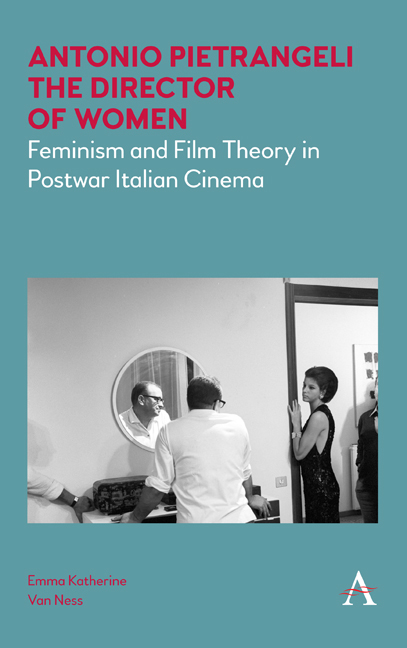Book contents
- Frontmatter
- Dedication
- Contents
- List of Illustrations
- Acknowledgments
- Vita
- Introduction: Antonio Pietrangeli, A Brief History
- Chapter 1 Pietrangelian Film Theory: From Neorealism to Feminism
- Chapter 2 Maid from the Margins: Il sole negli occhi
- Chapter 3 The Coming of Age of a Teenage Bride: Nata di marzo
- Chapter 4 Legally Bound: Political Realism and Prostitution in Adua e le compagne
- Chapter 5 Fantasmi a Roma: Sur-Realism and the Time-Image
- Chapter 6 The Dora Problem: La parmigiana, Piatti, Pietrangeli and Freud
- Chapter 7 Too Much Woman: Marriage, Power, and Excess in La visita
- Chapter 8 Breaking Faith: Il magnifico cornuto, Envy and the Crisis of Vision
- Chapter 9 Io la conoscevo bene … Or did I? Antonio Pietrangeli, the Author and the Actress
- Conclusion: Antonio Pietrangeli, Feminism and Film Theory
- Bibliography
- Index
Chapter 8 - Breaking Faith: Il magnifico cornuto, Envy and the Crisis of Vision
Published online by Cambridge University Press: 06 May 2020
- Frontmatter
- Dedication
- Contents
- List of Illustrations
- Acknowledgments
- Vita
- Introduction: Antonio Pietrangeli, A Brief History
- Chapter 1 Pietrangelian Film Theory: From Neorealism to Feminism
- Chapter 2 Maid from the Margins: Il sole negli occhi
- Chapter 3 The Coming of Age of a Teenage Bride: Nata di marzo
- Chapter 4 Legally Bound: Political Realism and Prostitution in Adua e le compagne
- Chapter 5 Fantasmi a Roma: Sur-Realism and the Time-Image
- Chapter 6 The Dora Problem: La parmigiana, Piatti, Pietrangeli and Freud
- Chapter 7 Too Much Woman: Marriage, Power, and Excess in La visita
- Chapter 8 Breaking Faith: Il magnifico cornuto, Envy and the Crisis of Vision
- Chapter 9 Io la conoscevo bene … Or did I? Antonio Pietrangeli, the Author and the Actress
- Conclusion: Antonio Pietrangeli, Feminism and Film Theory
- Bibliography
- Index
Summary
Le doute me tue, ou je le tue! On ne peut avoir, sur la fidélité d’une femme, que des présomptions, mais on ne peut posséder la preuve absolue de son inconstance.
— Fernand Crommelynck, Le cocu magnifique: farce en trois actesEnvy, Anxiety, Gender
Cuckold, or cornuto, is one of the most enduring insults in Italian, and European, culture. It is the lynchpin on which a man's honor hangs and has been so for centuries. Trevor Dean, in Crime and Justice in Late Medieval Italy, writes that a “mad furrier […] killed his wife on the road to Castrocaro in a fit of jealous suspicion, after his brother had called him a cuckold.” The dishonor, the rage, the term provokes is legendary. Cuckoldry, its semantic weight somewhat diminished through the centuries, is also central to the plot in Divorzio all’italiana (dir. Pietro Germi, 1961), and a recurring theme in the commedia all’italiana as well as auteur filmmaking of the fifties and sixties, found in the films of directors ranging from Fellini to Antonioni to Bertolucci. In Adulterio all’italiana (Adultery, Italian Style, 1966), gender roles are bent to the extent that Nino Manfredi's character cross-dresses to “stop Spaak [his wife] from sleeping with a company executive by seducing the man himself.” The absurdity of gendered conventions and how they relate to adultery are the object of parody for Pietrangeli and his contemporaries. Cuckoldry still triggers jealousy and anger as well as laughter and ridicule despite, or perhaps thanks to, its omnipresence in Italian postwar cinema.
Consequently, Pietrangeli's film is not entirely comedic in nature, as is typical of the commedia all’italiana. Its source is surprisingly serious and intellectual. The Belgian playwright Fernand Crommelynck, whose play Le cocu magnifique (1921), The Magnanimous Cuckold, was the source of inspiration for Pietrangeli's Il magnifico cornuto (1964), belongs to the inter-World War school of drama known as the teatro dell’inespresso. Alongside members such as Luigi Pirandello and later, in film, Michelangelo Antonioni, this school would come to characterize twentieth-century artistic production by representing the anxiety of communication, or rather man's inability to fully communicate with his fellow man. This incommunicabilità, incommunicability, functions as a fulcrum for psychological battles between characters as well as representational strategies by Crommelynck, the playwright, and later Pietrangeli as director.
- Type
- Chapter
- Information
- Antonio Pietrangeli, The Director of WomenFeminism and Film Theory in Postwar Italian Cinema, pp. 183 - 208Publisher: Anthem PressPrint publication year: 2020



